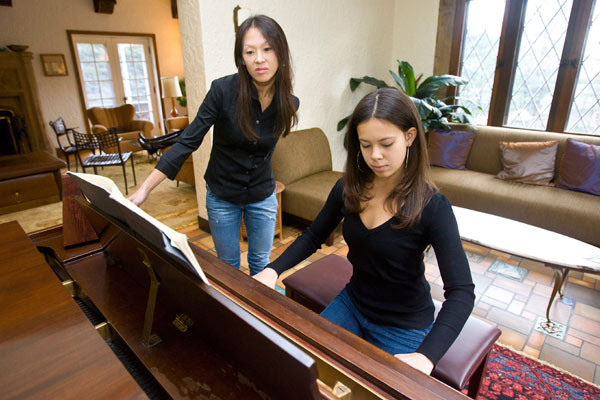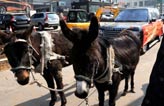Specials
Tiger Mom hears roar of opposition
Updated: 2011-01-26 07:08
By Shan Juan (China Daily)
 |
|
Amy Chua watches her daughter Sophia Chua-Rubenfeld practice playing piano in her home in New Haven, Connecticut, United States, on Dec 20. [LORENZO CINIGLIO / POLARIS] |
Beijing - As more Chinese parents adopt a Western style of parenting that allows children more freedom and encouragement, Amy Chua and her book lauding strict Chinese parenting as superior ignited unprecedented attention among Americans.
Chua made the cover of the latest issue of Time Magazine, continuing to provoke heated discussion among Americans over her alleged Chinese parenting methods including no grades lower than A, no sleepovers, TV or computer games.
The US-born, 48-year-old Yale law professor of Chinese ancestry argued in her book, Battle Hymn of the Tiger Mother, that strict Chinese parenting would better prepare children for harsh future competition.
As many in the US became furious at her "ruthless" way, asking "where is the love and respect for children," some are wondering whether the Chinese approach creates smarter people who can take the lead in the future global marketplace - especially after teenagers from Shanghai in December posted the top scores in an international test of practical knowledge in reading, mathematics and science.
The test, known as the Programme for International Student Assessment, was held by the Paris-based Organization for Economic Cooperation and Development and compared the performance of 15-year-olds from 60 nations and half a dozen so-called regional economies.
The US students, in contrast, ranked 17th in reading, 23rd in science and 31st in math.
Liu Pengzhi, headmaster of the High School Affiliated to Renmin University of China, one of the top high schools in Beijing, asked those upset Americans to ease their anxieties about the superiority of traditional Chinese parenting over the Western kind.
"In fact, the US would benefit more from the Chinese way of parenting as nowadays more top students in well-off urban China choose the US for higher education and future employment," she said.
Last year, China surpassed India to send the most students to the US, earlier reports said. By the end of 2010, students from China accounted for 19 percent of the international students in the US.
In 2009-2010, about 128,000 Chinese students were studying in the US, mainly in undergraduate and graduate programs, up 30 percent over the previous academic year, a study by the US-based Institute of International Education showed.
That the number of students from China is booming is because of a booming Chinese economy and a determination held by Chinese parents to invest money to ensure their children get the best education possible, Peggy Blumenthal, executive vice-president of the institute once told the New York Times.
That sounds true to a rising number of young and well-educated Chinese parents, who have begun to adopt a new parenting method largely inspired by the Western approach.
Allowing children the freedom to explore other possibilities besides academic study, respecting their rights to a happy and playful childhood, and more encouragement are among the key elements, said Sun Hongyan, a division director of the China Youth and Children Research Center.
"I won't raise my 8-year-old daughter as Chua suggests as that would make her unhappy and dull," said Yang Jianfen, a Beijing-based mom who holds a master's degree in Chinese literature and works as a civil servant.
"It's true children need prodding and discipline but a relaxed environment coupled with quality education will help foster smart, creative, and physically and mentally healthy children rather than the goof only good at academic results," said Yang.
In Chinese academic circles, some are also reflecting on the Chinese way of parenting and education, which seems challenged to raise creative minds like Bill Gates - a Harvard dropout.
"In my opinion, compared with highly strict Chinese parenting, the Western way exerts more positive influence on children's mental health," Cui Yonghua, a leading psychiatrist at Beijing Anding Hospital, told China Daily on Tuesday.
Cui pointed out that many Chinese parents now focus too much on children's IQ development and physical health but little on their mental health.
"That is mainly to blame for rising child psychological problems in recent years including attention deficit disorder, behavior problems and conduct disorders," he said.
"Scientific and good parenting is open and democratic. Parents should encourage more and praise their children for any achievements made while firmly stopping their bad habits as early as possible," he noted.
But he pointed out that it's not good for parents to protect their children from every pressure and discomfort.
"Parents should believe that children are able and flexible," he said.
China Daily
(China Daily 01/26/2011 page5)
Specials

London's Olympic Stadium
Construction on the flagship stadium for the 2012 London Olympics was completed Tuesday.

The queen of panda cubs
Spanish Queen Sofia laughs as she plays with a panda.

Donkey-powered Land Rover
Two donkeys pull a broken-down Land Rover in Shenyang, Liaoning province.